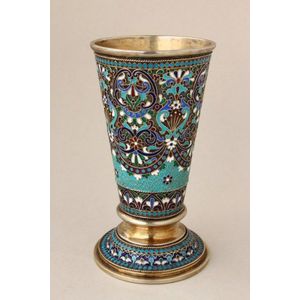Art Deco Silver Sugar Caster with Bone Finial
You must be a subscriber, and be logged in to view price and dealer details.
Subscribe Now to view actual auction price for this item
When you subscribe, you have the option of setting the currency in which to display prices to $Au, $US, $NZ or Stg.
- Sterling Silver - Sterling silver is a mixture of 92.5% pure silver and 7.5% of another metal, usually copper. Fine silver is 99.9% pure silver, and is relatively soft and the addition of the very small amount of copper gives the metal enough strength and hardness to be worked into jewellery, decorative and household objects.
- Caster - Casters are so-called because they ?cast? their contents over food. They consist of a container, usually in silver or pewter with a removable perforated top which allows for the sprinkling of condiments such as sugar, pepper and nutmeg.
- Art Deco Period - The Art Deco period was a cultural movement that emerged in the 1920s and 1930s, and was characterized by its emphasis on modernism, luxury, and elegance. The name "Art Deco" comes from the Exposition Internationale des Arts Décoratifs et Industriels Modernes, a large exhibition held in Paris in 1925 that showcased the latest trends in decorative arts.
Art Deco was a reaction against the ornate and elaborate styles of the previous era, and reflected a new modern sensibility. It was characterized by streamlined, geometric shapes, bright colours, and the use of new materials such as chrome, glass, and Bakelite. Art Deco designers sought to create a sense of luxury and sophistication, often incorporating expensive materials such as ivory, marble, and rare woods.
Art Deco had a significant impact on a wide range of artistic fields, including architecture, fashion, graphic design, and interior design. Some of the most iconic examples of Art Deco architecture include the Empire State Building in New York City, the Hoover Building in London, and the Palais de Chaillot in Paris.
The Art Deco period came to an end in the 1940s, as World War II and changing cultural trends led to a shift in artistic styles. However, Art Deco remains an important influence on design and art, and continues to be celebrated for its modernist sensibility and glamorous aesthetic. - George Vi - George VI (1895 ? 1952) was King of the United Kingdom and the Dominions of the British Commonwealth from 1936 until his death in 1952. He was the last Emperor of India, and the first Head of the Commonwealth. he was the father of Queen Elizabeth II.
- Finial - An architectural decoration, found on the upper parts of of an object. On furniture they are usually found on pediments, canopies and shelf supports. On smaller ceramic or silver items, such as spoons, they may decorate the top of the item itself, or the lid or cover where they provide a useful handle for removal.
Finials have a variety of shapes and forms. They may be urn-shaped, baluster shaped round or spiral, but usually taper into an upper point. Many real life shapes may also be used as finials, such as pineapples, berries, pinecones, buds, lotus and acorns. Sometimes animals such as a lion are depicted, or fish and dolphins.
This item has been included into following indexes:
Visually similar items

Good sterling silver vase hallmarked Sheffield 1900. Height 14.5 cm approx, 70 grams

Victorian sterling silver vase London 1895, makers William Comyns & Sons, extensive embossed floral decoration, height 25.5 cm weight 506 grams

Good Russian silver and enamel pedestal beaker, of tapering form, decorated with flower heads, stylised foliage and beading, on stepped circular foot, in tones of blue, white, red and green, gilt interior, impressed 84, B.A (possibly Vasily Akimov), total

A figural vase, peasants in a landscape, circa 1820, a mid green trumpet vase with a square reserve with canted corners depicting brightly attired peasants walking in a landscape setting, the reverse with a scrolling gilt foliate and shell forms, unmarked;
